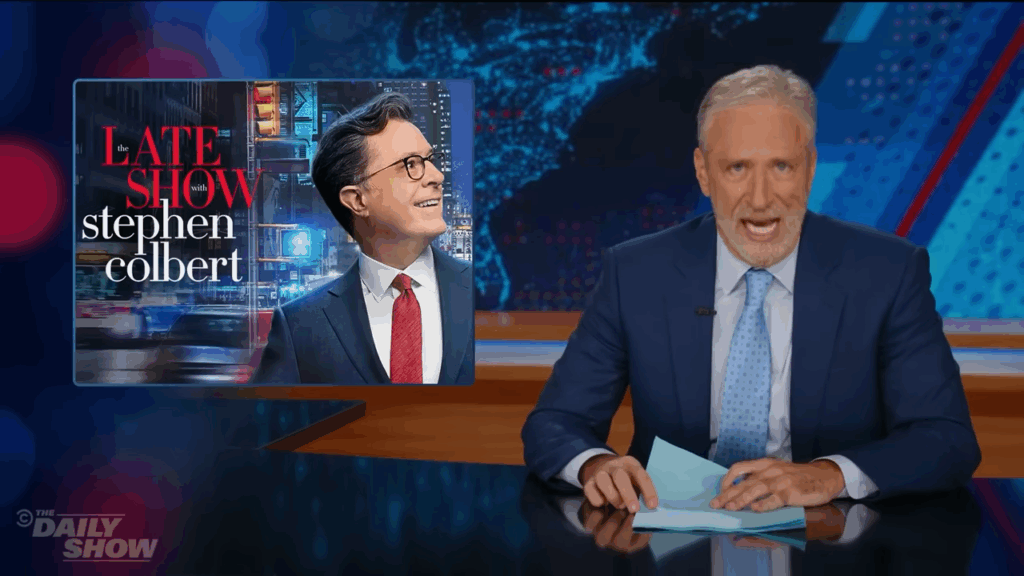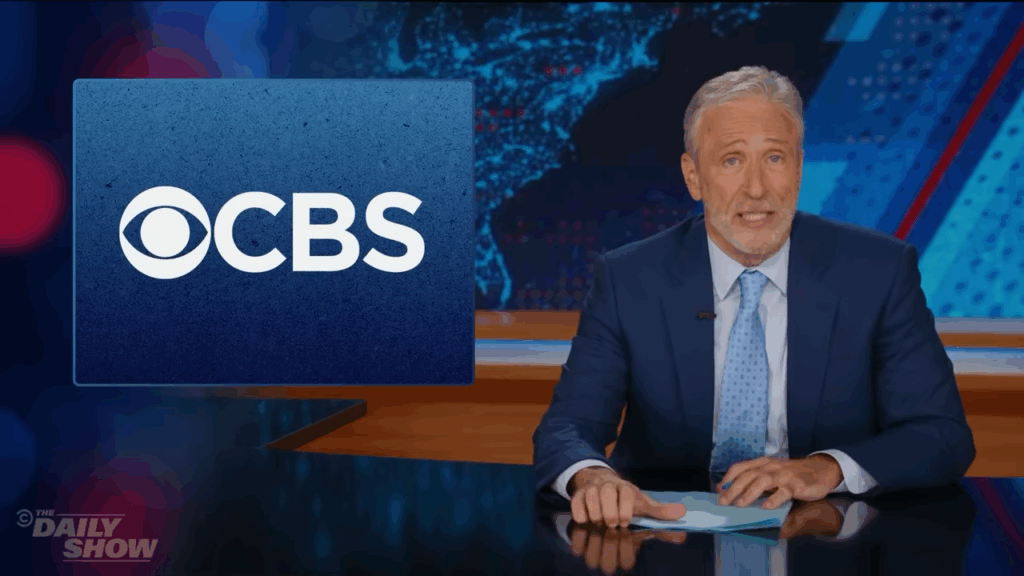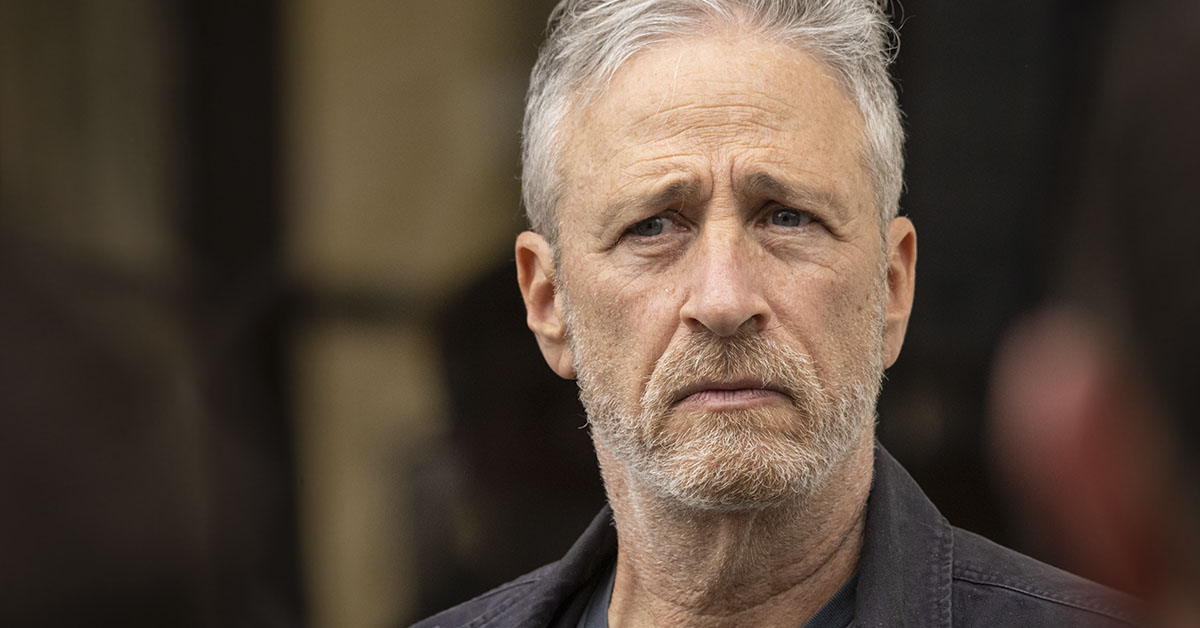Media companies across America have bent to political pressure since Donald Trump returned to office. They settle lawsuits quickly, avoid criticism, and make business decisions while watching for government approval. This fear now reaches even the most successful television programs. Profitable shows face cancellation not for poor ratings, but for political safety. Jon Stewart is calling out this corporate cowardice.
CBS Pulls the Plug
The latest example emerged last week when CBS announced it would end “The Late Show with Stephen Colbert” in May 2026. The network called it a “business decision” despite the show holding the number one spot in late-night ratings. For nine straight seasons.
The timing raised eyebrows. The announcement was made just days after Colbert criticized Paramount for paying Trump a $16 million settlement over a “60 Minutes” interview dispute. Colbert called it a “big fat bribe.”
Jon Stewart, host of “The Daily Show” on Comedy Central, used his Monday night show to defend his friend and former colleague. He responded with rare fury. The defense carries added weight because both Stewart and Colbert work under the same corporate umbrella at Paramount Global. The company faces an uncertain future as it seeks government approval for an $8 billion merger with Skydance Media.
The situation became more pointed when considering Stewart’s concerns about job security. Earlier this month on his podcast, Stewart had already expressed worry about his show’s future. He noted that Skydance executives “have called me and said like, ‘Don’t get too comfortable in that office, Stewart.” Just hours after those comments aired, Colbert announced his show’s cancellation.
Read More: Ricky Gervais Faces Backlash After Controversial Joke Ignites Fury
Jon Stewart Fires Back

“CBS, which happens to have the same parent company as the network this program currently airs on, abruptly cancelled the Late Show with Steven Colbear,” Stewart told his audience. He emphasized that “CBS has cancelled the entirety of the LateShow franchise. Gone.”
What bothered Stewart most was why CBS made no effort to save its most successful program. The franchise has operated for over three decades. Making people wonder whether the decision was truly financial, Stewart said, “or maybe the path of least resistance for your 8 billion merger was killing a show that you know rankled a fragile and vengeful president so insecure suffering terribly from a case of chronic penis insufficiency.”
Stewart acknowledged that “late night TV is a struggling financial model” and that hosts are “basically operating a blockbuster kiosk inside of a tower records.” But he rejected the purely economic explanation. Instead, he offered his theory about corporate fear driving the decision.
“If you’re trying to figure out why Steven’s show is ending, I don’t think the answer can be found in some smoking gun email or phone call from Trump to CBS executives,” Stewart said. “I don’t think it’s in CBS’s financial records on the financial health of late night either. I think the answer is in the fear and advance compliance that is gripping all of America’s institutions at this very moment.”
Corporate Fear Takes Over
This fear makes no business sense, Stewart argued. He pointed out that “the shows that you now seek to cancel, censor and control, a not insignificant portion of that $8 billion value came from those fucking shows.” Programs willing to take stands and express opinions created much of the value these companies now want to protect by surrendering.
Stewart warned that corporate executives delude themselves if they believe removing controversial content will provide safety. “If you believe as corporations or as networks, you can make yourselves so innocuous that you can serve a gruel so flavorless that you will never again be on the boy king’s radar, why will anyone watch you and you are wrong,” he said.
His frustration extended beyond defending Colbert. As Stewart sees the cancellation as part of a broader pattern of institutions choosing submission over resistance. “This is not a ‘We speak truth to power.’ We don’t. We speak opinions to television cameras, but we try,” he said. “We fucking try every night.”
Jon Stewart ended his monologue with a gospel choir-backed musical number, singing and chanting a profane message telling corporate executives and advertisers exactly what they could do to themselves. The host declared, “I’m not giving in, I’m not going anywhere, I think,” though that final word betrayed his uncertainty about The Daily Show’s future under the same corporate pressures.
The New Rules
The cancellation of Colbert’s show represents more than the end of one television program. When profitable, successful shows disappear not because of ratings or revenue but due to corporate anxiety, it shows something important. It demonstrates how political pressure now reshapes media decisions across the industry.
Companies that built their value through bold programming now seek to eliminate the very content that made them profitable. This retreat may satisfy short-term political concerns. But it establishes a dangerous precedent that could affect any programming that challenges authority or addresses controversial topics.
The entertainment industry now operates under different rules. Where media companies understand they face a president who files lawsuits and holds grudges. Both Stewart and Colbert work under Paramount’s control during a merger requiring federal approval from a Trump administration known for retaliating against media criticism. The corporate calculation becomes clear when viewed through this lens: avoid trouble now to secure business deals later.
Read More: Aerosmith Announces Their Retirement Due to Steven Tyler’s Vocal Injury
Standing Up or Giving In

Jon Stewart has drawn a line against this corporate cowardice. Using his platform to challenge executives who put political safety over creative principles. Whether other hosts and networks follow his example or choose the path that ended Colbert’s program will determine the future of political comedy on television.
For now, audiences must decide whether they will continue watching networks that offer what Stewart called “flavorless gruel” designed to offend nobody. Or whether they want programs that take risks and expresses real opinions. Stewart made his choice clear, but the ultimate decision rests with viewers and the corporate executives who fear losing them.

